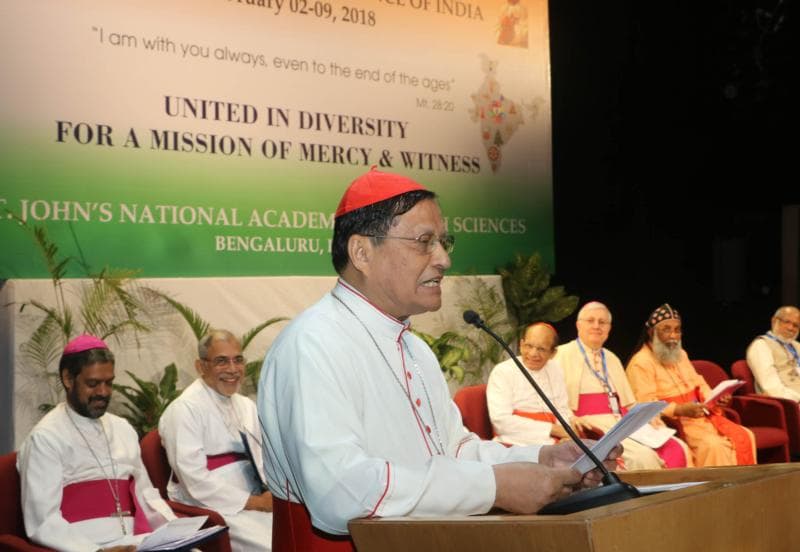MUMBAI, India – Myanmar’s first cardinal said the Catholic Church in the country has lived the life of the Old Testament figure Job — with no money, no manpower, no property.
Cardinal Charles Bo, Archbishop of Yangon, was speaking at the biennial assembly of the Catholic Bishops’ Conference of India, thanking them for providing many of the missionaries that brought the Catholic faith to his country.
“When Vasco da Gama came with missionaries to the Western coast he was humbled by the realization that before any European came to know the Christ, the light of the Gospel was shining on this great land. Your history, your numbers and the influence bring you to the front lines of Church in Asia,” Bo said.
The Church in India traces its roots back to St. Thomas the Apostle, who is believed to be buried in Chennai.
“Two-thousand years ago this nation encountered the message of Jesus. India has never been the same,” Bo said. “It is a great feeling to be with such a Church with long history. India stands with Corinth, Ephesus in the great mission history of the early Church.”
Bo was asked by the Indian bishops to speak about the Church in his country.
Myanmar, also known as Burma, was administered by the British as part of the Indian Empire from 1885-1937 and was formally granted independence in 1948.
Catholics in Myanmar number about 700,000 people, less than 2 percent of the population.
Despite its small size, the Church in Myanmar is very diverse, and most prominent among the country’s ethnic minorities.
This has caused discrimination and suspicion from the majority Burmese, whose ethnicity is often intertwined with their Buddhist faith.
“Until recently, the Burmese Church was a persecuted church,” Bo told the Indian bishops.
“On April 1, 1965, all our schools were nationalized, our properties were taken away, our missionaries were expelled,” the cardinal said.
“Overnight the Church was disempowered. Evil men thought we would never survive.”
Bo said the government – both the first elected government, and the military junta that followed – promoted a totalitarian policy of “one race, one religion and one language.”
“In our country the majority religion enjoys state protection, minorities are discriminated against in education and government jobs. Christians often felt they were the second-class citizens in their own land,” he added.
Bo said the members of the Church suffered, but “together we learned to survive first, and resist,” adding that they have not only “survived, but thrived.”
He said the international connections of the Catholic Church and the empowerment of the laity was vital for this process.
Now, the cardinal said, the Church is an example for the rest of the country.
He noted the diversity of the Church in Myanmar: There are 16 dioceses – four for the Karen ethnic group, three for the Kachins, four for the Chins, three for the Kayahs, and two with a mixture of ethnicities.
“We are in the process of evolving a common Catholic identity. Our success and struggle is to move across the ethnic identities towards common problems that brought us together and help us,” Bo said.
“Lack of opportunities for Catholics brought us to form educational commissions and make the poor an educated and empowered population,” he continued.
Yet the cardinal said the Church in Myanmar still faces several problems, including a climate of fear created by extremist groups.
“Even monks indulge in hate speech and even in violence,” Bo said, adding this was only a minority of the Buddhist clergy.
“You have heard about Rohingya problem. Extremist elements drive a wedge through communities,” he continued. “They force the government to enact black laws against minorities.”
The cardinal said the Church in Myanmar has responded by developing good relationships with the moderate religious leaders, diplomats, and the international community.
“By constantly interacting with the moderate elements in the majority religion we keep the violent fringe in the margin,” he said.
Yet Bo said the “biggest terrorism” in the region is poverty calling it an “evil that needs to be fought by the Church.”
He blamed a neoliberal economy that perpetuates inequality, noting that for 30 years “a crony economy” looted the rich resources in Myanmar.
“The resultant poverty brought in human trafficking,” Bo said, remember the large number of Myanmar youth trapped in modern forms of slavery throughout Southeast Asia.
The cardinal called for a “world war” against poverty and inequality.
“Our countries are extremely poor,” Bo said. “As priests we say the great words everyday: ‘Take and eat.’ We are painfully aware that nearly a billion go to bed with an empty stomach.”
Pope Francis visited Myanmar from Nov. 27-30, 2017, before going to Bangladesh until Dec. 2.
It was his second visit to South Asia, after travelling to Sri Lanka in 2015.















